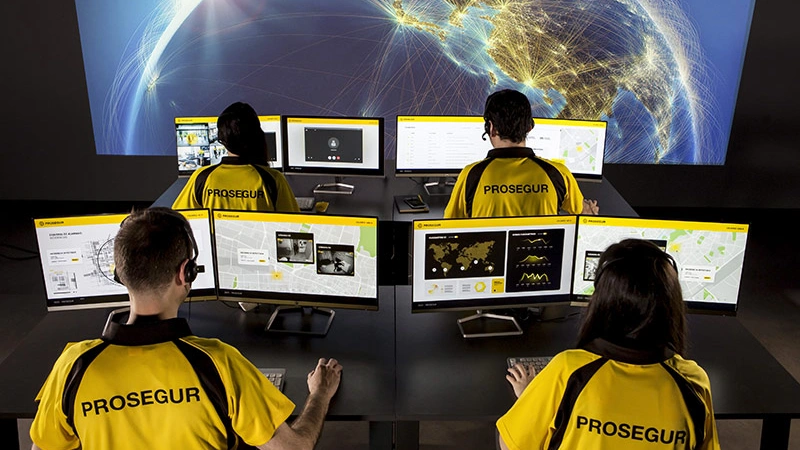Caring for the caregiver: Prosegur looks after its human capital
Prosegur's 175,000 employees working in the 34 countries where the company currently operates constitute the backbone of the Spanish company, and the main reason for its leading position. Stable employment, quality training, equal opportunities, comprehensive wellbeing and social commitment are the cornerstones of the philosophy that governs Prosegur's relationship with its human capital.
As in any self-respecting company, but especially in a sector in close collaboration with public services, the people who work there are a basic pillar in its strategy of consolidation and progress. In the case of Prosegur, this pillar, in addition to being very solid and stable (175,000 employees in all its business units), has a clear international stamp (its professionals are spread over 34 countries in the 5 continents) and is diverse, plural and highly qualified, from operational profiles to highly specialised technical and technological talent.

Juan Luis Martín, Global Director of Human Resources, Marketing and External Communications at Prosegur, defines the company's Personnel policy with a phrase that speaks for itself: 'We are a driving force for generating stable and quality employment'. It is not in vain that Prosegur systematically occupies the top three in the Spanish market by volume of employees (together with Inditex and Banco Santander), and the figures that have to do with human capital and its integral management give a very accurate idea of its magnitude.
Prosegur hires around 65,000 people a year worldwide (more than 15,000 in Spain alone), handles around 700,000 CVs a year and organises around 145,000 job interviews. In 2023 alone, it managed more than 2 million payrolls and processed some 55,000 terminations across all its centres. Who gives more?
The recipe for handling this enormous volume of staff, and doing so with the speed and effectiveness required by a basic pillar of the company, is provided by Martín himself: 'A strong commitment to technology and ongoing innovation in human resource management'. A palpable example of this determined vocation for innovation is the operation of the three shared services centres that Prosegur has in Spain, Brazil and Argentina (from here no less than 13 Latin American countries are paid), ‘fully robotised, managed with artificial intelligence (AI) and with highly automated processes, in order to provide a comprehensive and permanent service to all employees’, the Human Resources leader points out.
‘Prosegur hires around 65,000 people a year worldwide (more than 15,000 in Spain alone), handles around 700,000 CVs a year and organises around 145,000 job interviews.’
The perfect symbiosis between technology and personnel management is also very evident in the tool that Prosegur has developed for the processing of labour matters: LabourTech (which integrates predictive Big Data, AI and process automation), winner of several innovation awards; and in the digitisation of its candidate selection processes (which include internal AI chatbots, digital assistants and digital onboarding), which in addition to dispensing with the use of paper, ‘speed up and facilitate the procedures for candidates, who can upload all the documentation to our tools quickly, safely and easily; in just 40 seconds, a person can apply for any of our job offers and be registered in it’, summarises Martín.
.webp)
The Intranet app that Prosegur launched at the end of 2019 perfectly embodies the importance that the company gives to permanent contact with its employees, wherever they are, and the success of this application is evidence of how popular this philosophy is among the workers themselves: over 110,000 employees (nearly 75% of the total workforce) have already downloaded the app on their mobile phones, and more than 90% of them use it on a daily basis. Developed with native technology and available in all the languages in which Prosegur works, the application was redesigned in 2021 (to enhance its options and improve the user experience) and, in Martín's words, 'it offers a very wide range of possibilities: From downloading the monthly payroll or consulting the schedule and work shifts to accessing the Corporate University or the possibility of receiving periodic notifications'.
Social commitment

In addition to being a drive for stable, quality employment for that contingent of 175,000 people—which Martín graphically and affectionately defines as Prosegurers—, the Spanish company is deeply embedded in the economic and socio-cultural fabric of the countries in which it operates, and good proof of this is its direct involvement in the development of those communities. The numbers, once again, speak for themselves.
‘We reinvest 70% of our Ebitda in salaries and social programmes, and this not only benefits our employees and their families, but also the local economic structures, in the form of social security contributions, tax payments, infrastructure investment, participation in CSR initiatives...’, says the HR director.
‘We reinvest 70% of our Ebitda in salaries and social programmes, and this not only benefits our employees and their families, but also the local economic structures...’
Prosegur's commitment is also measured qualitatively, with its efforts to create 'a positive, safe and participative work environment' in Martín's words. It conducts surveys that give employees a voice; and it actively promotes a healthy lifestyle for teams and their families with the PRO360 project, thanks to which, among other things, more than 8,500 people run their digital race every year, or cycle more than 104,000 kilometres. A paradigm of the company's commitment to the environment in which it operates is the Prosegur Foundation, which has been developing, since 2005, various development cooperation programmes, mainly in Latin America.
Barely a year after its creation, in 2006, the Foundation launched a project that exemplifies Prosegur's involvement in social action, which Martín defines as ‘the apple of our eye’: Piecitos Colorados, a development cooperation programme that seeks to provide comprehensive education and promote the quality of life of children living in particularly vulnerable contexts. In its 18 years of existence, Piecitos Colorados has promoted the creation and reconstruction of 39 schools in 8 Latin American countries, which have already educated more than 5,000 students, and has supported the start-up and development of 20 additional educational centres throughout the continent.
Ultimately, Martín emphasises, 'not only do you impact the present of those communities in which you operate, but by supporting the training of future generations, you are demonstrating the company's commitment to its future'.

Gender equality benchmark
Stable, quality employment and social commitment go hand in hand with another of the company's hallmarks: the promotion of diversity, labour inclusion and gender equality, as attested by its recognition as the first company in the private security sector in the prestigious European ranking Diversity Leaders 2024, by the Financial Times, and its inclusion in the Ibex Gender Equality, the index that BME compiles with data from the CNMV, which recognises Spanish listed companies that have a representative percentage of women in their teams.
Not in vain, Prosegur was a pioneer in the sector in Spain with the signing of its first equality plan in 2014, the latest renewal of which was signed in 2023.
‘Prosegur was a pioneer in the sector in Spain with the signing of its first equality plan in 2014, the latest renewal of which was signed in 2023.’
Within the framework of this effort to build an egalitarian work ecosystem, the promotion of female leadership takes shape in the company thanks to #EmpoweredWomen, a programme that, since its launch in 2021, ‘has had a positive impact on more than 1,600 women in the company from 16 countries’, says Martín, ‘because they have been identified as high-performance professionals, because they have been awarded scholarships or because they have participated in one of the many initiatives promoted by the company to promote equality’.
These initiatives place Prosegur at the forefront of equality in its sector, with some 35,000 women in its workforce, around 20% of the total, a percentage which, in the words of Martín, ‘places us well above the average female presence in workforces with which we could compare ourselves, such as those of the Police and the Civil Guard, and corroborates the paradigm shift we have promoted in this regard in the private security sector’.
Development, a basic pillar
The solidity of this basic pillar that is people is based, among other things, on their qualifications, and Prosegur has been very clear since its foundation that the continuous development and training of its staff is its differential value in the market. In fact, its National Training Centre, based in Madrid, will be 40 years old in 2025, just eight years less than the company itself currently has; and the almost 2.5 million hours of training completed at Prosegur in 2023 (an average of no less than 16 hours per employee) are divided into different itineraries tailored to the different groups that make up the company.
The best example of the importance that Prosegur gives to the training of its staff is the so-called Corporate University, an online platform designed to offer a wide range of courses, seminars and training programmes to the entire staff. Accessible on mobile and in Prosegur's 4 corporate languages (Spanish, English, Portuguese and German), 'we are already creating content in Hindi, Chinese..., so that our colleagues in those countries also have access to the content, because training is part of the company culture and, in the end, it gives you a lot of cohesion that all employees have access to the same knowledge', argues Martín.

‘The best example of the importance that Prosegur gives to the training of its staff is the so-called Corporate University, an online platform designed to offer a wide range of courses...’
The HR manager also emphasises the agreements that the company has signed with educational institutions, so that this internal training acquires the hallmark of formal training, ‘in other words, so that it translates into an official qualification and adds to our employees’ CVs’. In this context, the agreement signed in 2023 with the ESIC Business School to issue an Agile Certification for the 2,500 employees of Prosegur CASH structure, and the agreement reached with the Complutense University to offer a Certification in Compliance.
All of these initiatives converge in a 'solid culture of meritocracy' - in Martín's words - with continuous performance evaluations and various talent plans that seek to 'ensure that each person in the company has access to all the necessary tools to develop their full potential'.
The focus that Prosegur places on the people who make up its human capital has a direct correlation in the idiosyncrasy of the company; not in vain, ‘Prosegur is people protecting people’, recalls Martín. With this philosophy in mind, it seems clear that human resources are not just another part of the company's corporate machinery, but rather the very centre of that machinery.



.webp)

.webp)
